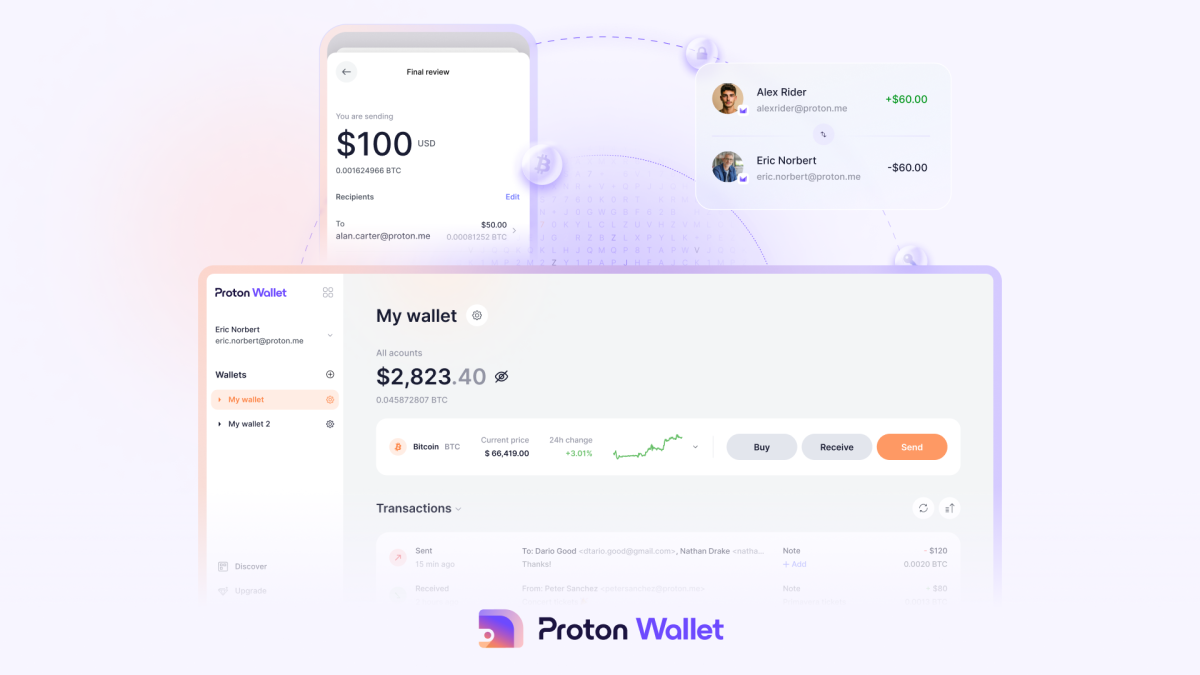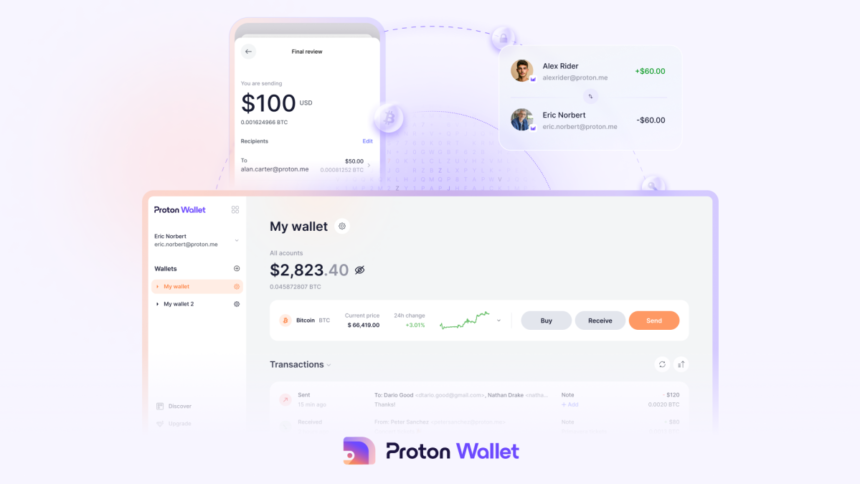
protonThe Swiss technology company, which develops privacy-preserving online tools like ProtonMail and ProtonVPN, Proton WalletA self-custodian Bitcoin wallet.
The new product will be integrated with ProtonMail, allowing users to send Bitcoin as easily as sending an email.
“Bitcoin’s social value has been hindered by transaction difficulties and security concerns, and we designed Proton Wallet to specifically address both,” said Andy Yen, founder and CEO of Proton, in a press release published by Bitcoin Magazine. “Proton Wallet’s ability to support Bitcoin via email makes Bitcoin transactions as easy to use as PayPal, while preserving Bitcoin’s decentralized and non-custodial nature.”
Proton Wallet is the latest addition to a suite of end-to-end encryption tools that help Proton users maintain their privacy while using the internet.
Before we go into the details of this new product, it is important to understand Proton’s motivation for developing it.
For Proton, the Proton Wallet is personal
Without Bitcoin, Proton might not exist.
“This summer is actually Proton’s 10th anniversary,” Yen said in an interview with Bitcoin Magazine.
“We ran our first crowdfunding campaign in July 2014, but midway through the campaign, PayPal froze the funds, which meant Proton was in jeopardy at the very start,” he added.
“When our crowdfunding campaign ended, we added a Bitcoin donation link. That’s when we first started receiving Bitcoin. It was at that moment, 10 years ago, that we first realized the true power of Bitcoin and what it could enable.”
Yen also said the Proton team had discovered that Credit Suisse, the bank that managed the company’s fiat funds, Collapse in March 2023.
“Credit Suisse was in limbo, not knowing if they were going to be bailed out,” Yehn recalled. “Having a large portion of their reserves in Bitcoin pretty much guaranteed the long-term sustainability of the business, and it was actually a smart move.”
Dingchao Lu, director of Proton Wallet and the company’s first employee, also appreciates the role Bitcoin has played in Proton’s history and hopes it can play a similar role for Proton users around the world.
“We want to reduce the world’s reliance on centralized financial institutions,” Lu said in a press release published by Bitcoin Magazine. “By giving users control over their own cryptographic keys and digital assets, we will provide financial freedom, increased privacy and security to millions of people around the world.”
Lu also said that Proton has long seen economic benefits from holding bitcoin as an accepted form of payment.
“We’ve been accepting bitcoin payments since we launched in beta in 2016,” he said in an interview with Bitcoin Magazine.
“It’s worked well for us. The price of Bitcoin has gone up about 100x since the early days, but we continue to hold Bitcoin,” he added.
detail
Proton will leverage its existing infrastructure to make Proton Wallet more user-friendly.
To use Proton Wallet for a Bitcoin transaction, both the sender and recipient must have a wallet. The sender only needs to know the recipient’s email address (whether it’s a ProtonMail address or not) to send Bitcoin.
Behind the scenes, Proton rotates Bitcoin addresses every time a user sends or receives Bitcoin, preventing addresses from being linked to a user’s identity.
As mentioned above, Proton Wallet is non-custodial, meaning that only the user has access to the funds in the wallet. Proton will provide a “robust recovery method” for these keys, but has not yet provided what that recovery method will be. Bitcoins held in Proton Wallet can be retrieved even if Proton goes offline.
Proton has not yet implemented Lightning mainly for one reason: all transactions using Proton Wallet are made on the base chain.
“Lightning is very hard to run uncustodial,” Yen said.
“If you want to have unmanaged lightning and let people open their own channels, that’s a user experience that’s not been solved yet at this point,” he added.
“But if we can find a way to work around the user experience issues, we could add Lightning support in the future.”
Proton makes it easier for people to buy Bitcoin by offering on-ramp integrations in over 150 countries.
Additionally, Proton Wallet also supports two-factor authentication, including hardware security keys, and provides users with access to Proton Sentinel, which uses machine learning and AI to thwart malicious login attempts. Proton Sentinel helps protect users’ accounts if they are compromised or an attacker gains access to users’ login information.
How to get started with Proton Wallet
Proton Wallet is currently only available to Proton Visionary users. Proton Project Normally only available to legacy users, it was reopened for a limited time to “selected Bitcoin community members” as part of an early access program.
Participants will be able to invite their friends and in future the product will be available to all Proton users.
In a press release shared with Bitcoin Magazine, Proton also revealed that it will be launching a waiting list for those who want to start using the Proton Wallet.








